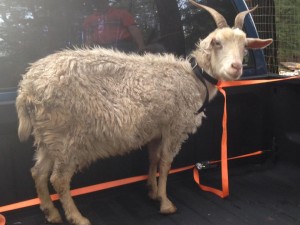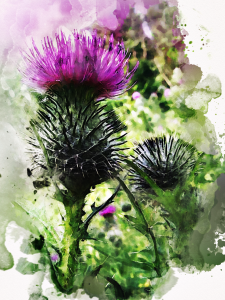Pippin & Simile: Love Makes a Family
There are clues to her history, but no one know for certain. She was found wandering Skyway, the main artery that runs the length of Paradise Ridge. She was loose in Magalia, an area of thick Ponderosa pine forest. Unknown persons corralled her and brought her to a family nearby who had two 4H male Boer goat kids.
We named her Peregrine Finale, Pippin for short. Peregrine means traveler; Finale to signal that this is her last destination. She’s an elderly cashmere goat, bred for fiber. Judging from her teeth, and lack of them, she could be from eight to eighteen. When she arrived at her foster family, they thought she was close to giving birth. But as days passed, they realized she had already birthed, probably while feral. One can only guess the fate of her kid. Was it stillborn, due to her poor condition? Taken by a predator? Did her previous owner keep the kid and turn Pippin out? We’ll almost certainly never know. Pippin’s right ear has two holes for eartags and a gap slicing through them. She has probably been to auction at least that many times.
Her health and overall condition were very poor. She was malnourished and in considerable pain from arthritis, and also foot rot, probably resulting from being confined in unclean conditions. Her sought-after fiber was matted, dull, and full of debris. She was generally passive and disliked attention, especially touch.
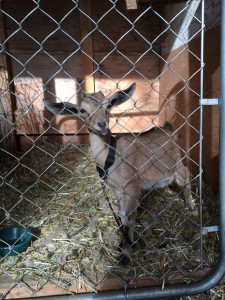 The day before Pippin was scheduled to be transported to The Seldom Herd, we welcomed an eight week old doeling, one of triplets who had been rejected by her mother after she nearly drowned in a vat of used motor oil. Moving past how someone let that happen…She had recovered but she was a runt for her mini-Nubian/Nigerian Dwarf mix. Her first humans had made lemonade of her situation and named her Olive. Rather than have her forever identified with one terrible moment of her life, we renamed her Simile, because I’m a poet, she’s a Heinz 57 of a goat, and it’s just a fun word. (Having trouble? Rhymes with Emily…)
The day before Pippin was scheduled to be transported to The Seldom Herd, we welcomed an eight week old doeling, one of triplets who had been rejected by her mother after she nearly drowned in a vat of used motor oil. Moving past how someone let that happen…She had recovered but she was a runt for her mini-Nubian/Nigerian Dwarf mix. Her first humans had made lemonade of her situation and named her Olive. Rather than have her forever identified with one terrible moment of her life, we renamed her Simile, because I’m a poet, she’s a Heinz 57 of a goat, and it’s just a fun word. (Having trouble? Rhymes with Emily…)
Actually, at first, we thought to call her Seti, after the Search for Extra Terrestrial Intelligence, because, with her comical ears and long, dark eyes, she looked a bit alien. But then we’d spend her whole life explaining that to people, which never happens with the name Simile…
We start new recruits in our nursery pen, no matter their age. There we supervise visits with one Seldom Herd goat at a time, as well as the Livestock Guardian Dogs. Goats often arrive with little experience with dogs, much less guardians the size of bears who are excited to smell up new recruits! As they adjust, we supervise them in the outer pen and try to control their discovery of the electric netting, so that they don’t mistake a dog or goat for being the cause of their unpleasant jolt.
We planned to pair Pippin and Simile with each other, hoping Pippin would adopt Simile, replacing the relationships they’d lost. It worked wonderfully! Pippin had a lot of healing to do so she was reserved at first. But we addressed her hooves, matted coat, and arthritis pain with our vet and, with ongoing pain killers, Pippin really pepped up!
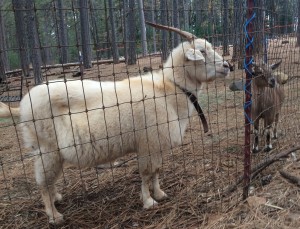 The two are now mother and daughter and will be together to the end. Little runt Simile has grown long-legged and tall. Pippin seems to be aging in reverse. She’s become the queen goat and actually runs up and down the slope with the others, joining in goat games. She’s a dutiful monarch to all our goats, but Simile is her heir apparent. Pippin still ushers her to the best browse and swipes her horns to shoo others away. They bed down together. While I comb, cut and brush out Pippin’s fiber, Simile is a satellite around us, nibbling on my shirt and restless for her turn!
The two are now mother and daughter and will be together to the end. Little runt Simile has grown long-legged and tall. Pippin seems to be aging in reverse. She’s become the queen goat and actually runs up and down the slope with the others, joining in goat games. She’s a dutiful monarch to all our goats, but Simile is her heir apparent. Pippin still ushers her to the best browse and swipes her horns to shoo others away. They bed down together. While I comb, cut and brush out Pippin’s fiber, Simile is a satellite around us, nibbling on my shirt and restless for her turn!
Subscribe to this blog's RSS feed
Thanks on My Last Days of Preorders
Many thanks to Finishing Line Press publisher Leah Maines and her staff! Despite losing four months of prep time to the Camp Fire, I have learned a lot in Thistle and Brilliant’s two month promotional period. FLP has been great, suggesting books to read on poetry promotion and tutoring me on press releases, print and radio interviews, and swag!
As I shift gears now, to a deeper edit of the next collection (Skeptical Goats), applying to Goddard’s MFA program, and envisioning possible T&B fall tours in Kentucky and the East Coast, I feel firmly supported by friends and family in my current and former homes. I think sentimentally of Kentucky, with a poem Leah once selected for FLP’s journal, Paddock Review. It first appeared in Canary, Literary Journal of the Environmental Crisis:
Tupelo Coyote
We were tracing Jack’s Creek
where the woods abducts it from the rolling
hills of dairy cows and tobacco.
I on the asphalt, you behind the tupelos.
You stalked me like a fan
afraid to ask for my autograph.
Those alien eyes,
calculating,
measuring my marrow
bend after turn, always
thirty paces aside.
Now you trot out in the farmlands,
legs like tobacco sticks, mapping the median line.
I am roadside, reading.
You are storybook real.
I speak to you, familiar,
as if you are the family dog.
Your answer is a glare-beam
that rips me, rights me.
You put me in the landscape,
that’s all.
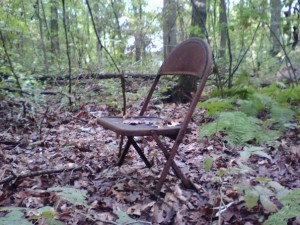 Wherever I’ve lived, as close as my relationships were, this solitude has often populated my poems. As I live in California, far from lifelong friends, as I submit a collection of poems called Heathcote, exploring my intentional community experience, I think of my ultimate solitude poem as being symbolic of my Maryland life, and my distance from it. Included in Thistle and Brilliant, I was honored to have this poem first appear in The Cafe Review:
Wherever I’ve lived, as close as my relationships were, this solitude has often populated my poems. As I live in California, far from lifelong friends, as I submit a collection of poems called Heathcote, exploring my intentional community experience, I think of my ultimate solitude poem as being symbolic of my Maryland life, and my distance from it. Included in Thistle and Brilliant, I was honored to have this poem first appear in The Cafe Review:
Folding Chair
I told you then I would take it out back
and kill it with a knife. But I couldn’t do it.
You stumbled upon my love today as then.
It’s a folding chair, forgotten in the woods,
rusting beside living oaks and rotting, jutting stumps,
unsuitable seats. Your mind tries to pick up its stories
from the air around. A picnicker, a hunter, absent minded
yogi. But stories are noise, excuses. Mute air transmits
this year’s bird noise, same as the moment before
and the moment after this chair was left here.
You realize the years, four legs grounded through
snow mounding and hurricanes, the inflating
and shriveling of mushrooms. Fox and mouse,
mouse and beetle, squirrel and squirrel.
Food and urges and panic. I remember loving you.
There was noise.
Mute, awake air, used to being taken in and released,
doesn’t suffer seasons or fools, doesn’t root for predator
or prey, doesn’t pray that you find your own heart
among curly, restless ferns. I still do.
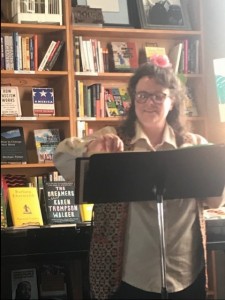
Wren at Not. Love. Poems., T&B event at Blackbird in Chico. Photo by Poemcrazy author Susan Wooldridge.
I still do! Hopefully I’ll visit the East Coast in the fall.
I found that folding chair in the woods of Heathcote and brought it to my cabin as an artifact. After photographing it a few times, one day I slipped on my icy porch steps, fell on it, and turned it into a rusty metal pancake. That wasn’t funny at the time, but now I smile.
If I set any records at FLP it may not be for copies sold but for most people thanked in my book. Some birthed me, literally and figuratively, some give endless feedback in critiquing groups, some donated to The Goat Boat that provided me with a workspace and then saved us all in the Camp Fire. When I see the galleys, I’ll probably want to squeeze in more names. I have asked a lot of my disparate community and you have answered with your usual candor mixed with love and a wink.
As a project person, asking is my job. So for almost the last time in T&B’s promo period, I’ll throw it out–If you haven’t ordered your copies, (and yes, wink-wink, if you’re this late I expect you to buy multiples!) please link to FLP’s T&B page or, if you prefer to order through me, contact me via email or Facebook by April 26th, 2019.
What Does the Title, Thistle and Brilliant, Mean?
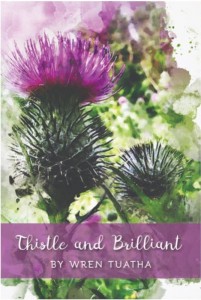 I’ve been asked this a couple of times at readings. Especially since the words are different parts of speech, and since I don’t always share the tiny title poem, I understand the curiosity. This poem sets the tone for the collection. Before it kicked off my chapbook, it was the lead-off poem in a spring themed edition of Midnight Circus. I love the cover of this journal, a nice watercolor of a skull holding plump flowers like a vase. That gives readers a clue that this is not going to be a lollipops and bumble bees treatment of spring. Then comes my poem to bring the point home:
I’ve been asked this a couple of times at readings. Especially since the words are different parts of speech, and since I don’t always share the tiny title poem, I understand the curiosity. This poem sets the tone for the collection. Before it kicked off my chapbook, it was the lead-off poem in a spring themed edition of Midnight Circus. I love the cover of this journal, a nice watercolor of a skull holding plump flowers like a vase. That gives readers a clue that this is not going to be a lollipops and bumble bees treatment of spring. Then comes my poem to bring the point home:
Thistle and Brilliant
Sweet Thistle, purple
and green. It looks
almost furry
in the brilliant
rising light.
It makes you want
to take it in hand,
despite all you know.
Muppets are such liars.
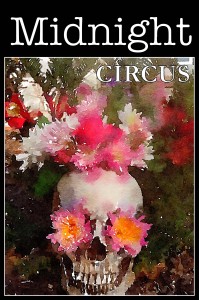 Like most of my poems, this avoids telling a narrative story in favor of letting images make my point. Yes, Thistle was once a lover of mine, this poem getting born at the moment I realized that was a bad idea. The last line, make the prickly Thistle into a muppet, even more cuddly on sight, came much later in rewrites.
Like most of my poems, this avoids telling a narrative story in favor of letting images make my point. Yes, Thistle was once a lover of mine, this poem getting born at the moment I realized that was a bad idea. The last line, make the prickly Thistle into a muppet, even more cuddly on sight, came much later in rewrites.
So, rather than my collection being love poems of adoration and longing, the reader knows right off the bat that these are poems of assessment and decision making, boundaries and negotiation.
In my mind, the narrator is the “brilliant rising light,” circling Thistle, flirting just a bit, keeping some distance. To me, they’re lovers/about to be/or not, thus Brilliant’s place in the title of the poem and the book. These are poems of the dance!
To order Thistle and Brilliant by Wren Tuatha, visit her page at Finishing Lin Press here.
I’m the Book of the Day!
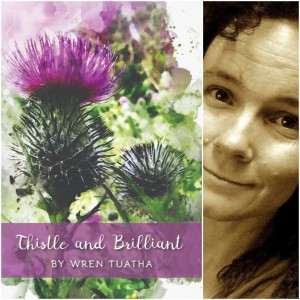 Today my publisher, Finishing Line Press, honors my poetry collection, Thistle and Brilliant, as their Book of the Day. How fun! This is a great opportunity for me to give more details about this book and its meaning to me.
Today my publisher, Finishing Line Press, honors my poetry collection, Thistle and Brilliant, as their Book of the Day. How fun! This is a great opportunity for me to give more details about this book and its meaning to me.
A few years ago, chronic health problems I’d been living with got worse. I moved to California and focused on healing with great support from C.T. At some point I realized not only that my condition had affected my brain and made communication and concentration difficult, but that I hadn’t written a single poem in five years. With a few publishing credits to my name and a long career as a performance poet, this was a significant part of my identity as writer/educator.
Not knowing if I would improve my health, I decided to curate my old poems into a manuscript, in the hope of at least getting a book of my free verse published in my lifetime. I pulled my poems out of a discarded hard drive and posted them in a few online critiquing forums. I sculpted and shaped them and started submitting.
As acceptances and rejections came in, I even threw together a submission to Finishing Line Press’ 2017 New Women’s Voices Chapbook Competition. From that submission, FLP actually offered me a publication deal! I had to confess to them that I’d only entered in the hope of winning the $1000 prize, as we were struggling financially and could use the prize for rent. At the time, with my health still poor, and having recently moved from all my East Coast contacts, I didn’t feel I could promote the book as their contract requires. So, bizarrely, I turned them down!
I kept submitting batches of poems to literary journals. With time on my hands and loads of feedback from critiquing forums, I published over sixty poems in a single year.
I learned more about the writing community when I accepted a position as editor of an online journal. The office politics there inspired me to found my own literary magazine, Califragile.
Working with poems, mine and others’, is like doing puzzles. It has been fantastic for healing my brain. As I edited and critiqued, I started to stab at writing new poems. It was awkward and slow. But eventually, I got back on the horse!
When the call came again, I entered the 2018 New Women’s Voices Chapbook Competition. This time FLP accepted two of my manuscripts for publication, Thistle and Brilliant, a collection of older poems, and Skeptical Goats, all new California poems! What a personal triumph for me. Not only did I succeed in my goal of getting a collection of my old poems in print, but I got a bonus prize I didn’t expect when I started–I’m a poet again!
Thistle and Brilliant, Poems of Relationships in Motion
These are not love poems, waxing in adoration. These are portraits of moments, narrators noticing as relationships start, end, dim or brighten, become uneven, save the day or never stand a chance. The pronouns are, shall we say, flexible, as am I. Some of these started as autobiographical, some are fiction, exploring interesting ideas. There are repeating characters and imagery, such as Mika, the wise little raccoon, plus watches and clocks, the micro and macro, and no collection of mine would be complete without mammoths, raccoons, wrens and Americans.
Cultural influences include The Accidental Tourist, #MeToo, and the scientific relationship between scent and memory.
The Camp Fire Will Not Win
About the time I would have started scheduling interviews, readings, house parties and other promotions for Thistle and Brilliant, the Camp Fire happened, forcing us to evacuate our home, destroying my partner’s business, and decimating and area around our neighborhood the size of Chicago. Even with our modest finances, I had planned to tour the East Coast and my home state of Kentucky. Instead, I was shoved inside an RV in a stranger’s front yard, breathing through a gas mask for weeks.
I managed to reconnect with poet Marge Piercy on a borrowed laptop. She was reading Thistle and Brilliant at the time of the Camp Fire, and writing an endorsement blurb. I sent her dispatches from the evacuation zone, eager to share details not covered in the media. Marge got it right when she wrote, “It sounds like you’re safe, but you’re safe in Hell.” Yep.
As we returned to our surviving house, surrounded by miles of scorched neighborhoods, I returned to the job of preparing for my book’s two month promotional period, a time for me to actively solicit preorders for my book. FLP takes this time as a good indicator of how large a press run they should plan. (As a first time poet/author, I am paid in a percentage of that press run, free copies for me to sell, gift, and submit for prizes and awards.)
It seemed strange after the horror and shock of the Camp Fire to invite people to buy a book of “love” poems with a big purple flower on the cover. But I was realizing a life goal. I didn’t want the Camp Fire to take this away from me, along with everything else it had consumed.
Instead of the grand tour I’d planned, I simply stayed in Butte County and on Facebook. I managed several public readings, three radio interviews and a number of house parties. I messaged, emailed, texted, and called friends and family. It’s not the splash I’d geared up for, but I feel it’s a strong showing despite the cinders!
Just Four Days Left!
If you have not ordered your copy of Thistle and Brilliant, please click here or get in touch with me. I would love to sell about forty more, so if you can add extras as gifts or donate one to your local library, that would be shiny! Please share my link on social media and email it to friends you think might be interested. Know any fledgling poets? I will critique three poems for each copy of T&B they order! Thank you for joining me in my publishing adventure!
Samples from Thistle and Brilliant
Cornbread
Cotton takes care of me.
I mend and wonder where
a word went as Cotton hops
out of bed, feeds the herd,
showers. I’m late with his
coffee. I have one job as he
capers around, clipboards
and clients’ keys, leash
and a dog to walk.
My hours pass in turns of
whiplash and molasses.
I’m glad he’s at work,
not watching. We both recall
when I was brilliant.
He soldiers and I try.
Who takes care of Cotton?
He’s aged out of his market.
Once six figures, now Cotton
cleans houses. Five today,
done at six. Home at seven
with rags to wash and stories.
Spreadsheets and payroll.
Menu ideas and shopping lists.
Leash and a dog to walk.
Cotton cares into the void.
Tonight he’ll make cornbread.
(First published in The Cafe Review.)
Wicker Me
Wicker me.
Bend me.
Weave me into a rocker and I’ll
wait on your porch with your
faithful dog Bart.
Some August night is our blanket.
Park your clogs
and I’ll rock you,
creak next to your skin,
cushion you into your ease.
Wavy pool of cricket songs
and horns out on the interstate.
Wicker me into a painting of this.
(First published in Lavender Review.)
Specific as a Seed
Specific as a seed,
not an oak if it’s a holly,
my next poem will break
your heart. You will see
a sunrise for the first time
and be still with your coffee
and your breath, remember
the gloves you left
at Brenda’s. You’ll revisit
a poem on film
and your polemic
over my pet chicken.
You will see a sunrise
for the first time
as a canyon fire,
out of control,
and you will buy
a ticket home.
You, standing in my
yard, will be to me
as specific as a seed.
(First published in Avatar Review.)
